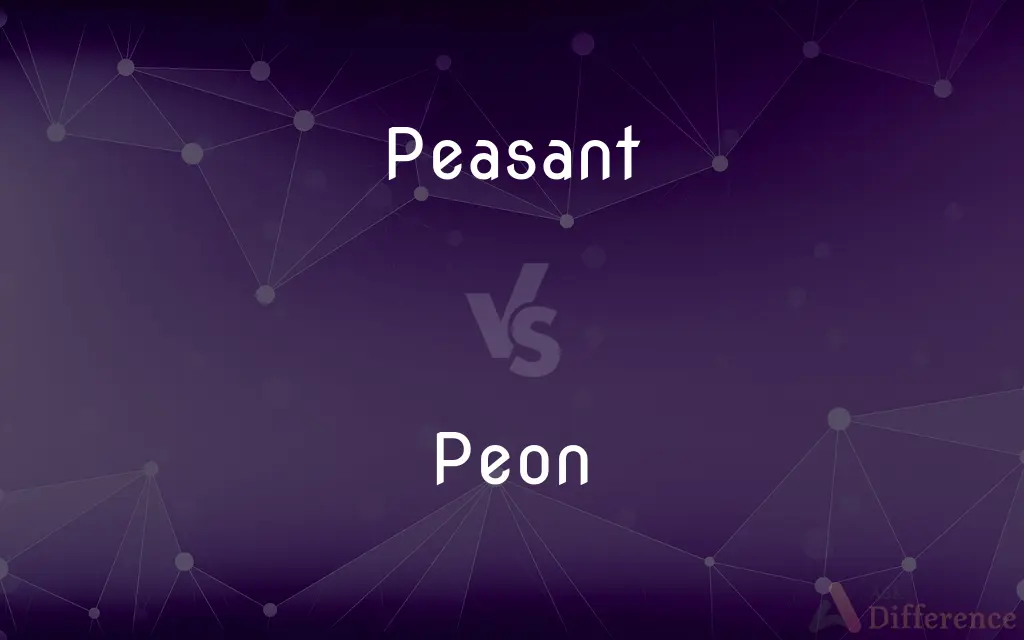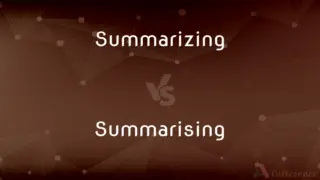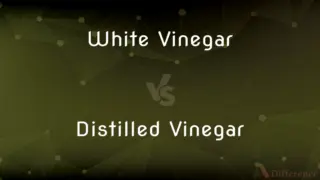Peasant vs. Peon — What's the Difference?
By Tayyaba Rehman — Published on October 2, 2023
A "Peasant" is typically a smallholder farmer or agricultural laborer, while a "Peon" often refers to a laborer with little control, sometimes working to pay off debts.

Difference Between Peasant and Peon
Table of Contents
ADVERTISEMENT
Key Differences
The terms "Peasant" and "Peon" refer to distinct socio-economic classes, each portraying a different set of roles, characteristics, and historical contexts. A "Peasant" is traditionally recognized as an individual primarily engaged in agriculture, often owning or renting a small piece of land and living in rural areas. "Peasants" typically work the land to produce food and other goods. On the contrary, a "Peon" usually denotes a person in a position of servitude, compelled to perform labor, often due to debt obligations, usually having little to no control over their employment conditions or terms.
While "Peasants" might own or rent the land they cultivate, their means and resources are usually limited, placing them in a lower socio-economic class, often associated with a rural, agrarian lifestyle, and sometimes perceived as uneducated or uncultured. "Peons," historically, were bound to their service due to debts, working under conditions that were typically oppressive, rendering them subjugated, with minimal rights or freedoms, essentially depicting a form of unfree labor or servitude.
"Peasant" is a term that encompasses a broad range of agricultural workers, from smallholder farmers to agricultural laborers, often emphasizing their connection to the land and their engagement in food production. In different societies and historical periods, "Peasants" have been integral to sustaining populations through food production, often forming the backbone of agrarian economies. In comparison, "Peon" specifically highlights the disadvantaged and subjugated status of the individual, with emphasis on the lack of freedom, autonomy, and rights, primarily highlighting the exploitative nature of their employment or service.
In literature and discourse, "Peasants" are often portrayed as symbols of rural simplicity and purity, sometimes romanticized for their closeness to nature and the land, and other times, depicted as uncultured and ignorant. "Peons," conversely, are typically represented as victims of exploitation and oppression, their status serving as a critique of social injustice and inequality, and symbolizing the plight of the disenfranchised and subjugated classes.
Differentiating between "Peasant" and "Peon" is essential for understanding social structures, economic systems, and historical contexts. While "Peasants" are characterized by their agrarian roles, ownership or access to land, and production of food, "Peons" are distinguished by their subjugation, lack of freedoms, and often, the coercive and exploitative conditions under which they labor.
ADVERTISEMENT
Comparison Chart
Primary Role
Agricultural laborer or smallholder farmer.
Laborer in a position of servitude, often due to debt.
Socio-economic Class
Typically lower, with limited means and resources.
Subjugated, with minimal rights or freedoms.
Ownership/Control
Might own or rent the land they cultivate.
Typically have little to no control over their employment conditions.
Representation in Literature
Often symbolizes rural simplicity and purity or depicted as uncultured and ignorant.
Represented as victims of exploitation and oppression, symbolizing social injustice and inequality.
Connection to Land
Integral, engaged in agriculture and food production.
Not necessarily connected to land or agriculture, defined more by their servitude.
Compare with Definitions
Peasant
A person belonging to a lower socio-economic class, typically living in rural areas.
The life of a peasant was tough, marked by hard work and simplicity.
Peon
A person in a position of servitude, often working to pay off debts.
The peon labored tirelessly to repay his accumulated debts.
Peasant
A term symbolizing rural simplicity and purity in literature.
The character of the peasant in the novel symbolized innocence and virtue.
Peon
A laborer with little control over employment conditions or terms.
The peon worked long hours under the harsh sun, with minimal rest.
Peasant
Historically, an individual in agrarian societies contributing to food production.
Medieval peasants were integral in sustaining the population through their agricultural activities.
Peon
A representation of exploitation and oppression in discourse.
The story highlighted the peon's struggle against injustice and subjugation.
Peasant
A person engaged in agriculture, producing food and goods.
The peasant worked from dawn to dusk, ensuring a good harvest.
Peon
Historically, an individual working under coercive and exploitative conditions.
The peon was bound to his service due to his debts and had little freedom.
Peasant
A smallholder farmer or agricultural laborer.
The peasant tilled the land to grow crops.
Peon
A term symbolizing social injustice and the plight of the disenfranchised.
The life of a peon illustrated the grim reality of inequality and subjugation in society.
Peasant
A peasant is a pre-industrial agricultural laborer or a farmer with limited land-ownership, especially one living in the Middle Ages under feudalism and paying rent, tax, fees, or services to a landlord. In Europe, three classes of peasants existed: slave, serf, and free tenant.
Peon
Peon (English , from the Spanish peón [peˈon]) usually refers to a person subject to peonage: any form of wage labor in which a laborer (peon) has little control over employment conditions. Peon and peonage can refer to both the colonial period and post-colonial period of Latin America as well as the period after the end of slavery in the United States, when "Black Codes" were passed to retain African American freedmen as labor through other means.
Peasant
A poor smallholder or agricultural labourer of low social status (chiefly in historical use or with reference to subsistence farming in poorer countries)
Peasant farmers
Peon
A person who does menial or repetitive tasks and has a low rank in an organization or society.
Peasant
A member of a class of small farmers and farm laborers, especially in a preindustrial or underdeveloped society.
Peon
An unskilled laborer or farm worker of Latin America or the southwest United States.
Peasant
A person who lives in a rural area; a rustic.
Peon
Such a worker bound in servitude to a landlord creditor.
Peasant
A person who is considered crude or uncouth; a boor.
Peon
(also pyn) In India and other parts of South and Southeast Asia, a person of menial position, especially a messenger, servant, or foot soldier.
Peasant
A member of the lowly social class that toils on the land, constituted by small farmers and tenants, sharecroppers, farmhands and other laborers on the land where they form the main labor force in agriculture and horticulture.
Peon
A lowly person; a peasant or serf; a labourer who is obliged to do menial work.
Peasant
A country person.
Peon
(figurative) A person of low rank or importance.
Peasant
(pejorative) An uncouth, crude or ill-bred person.
Peon
A messenger, foot soldier, or native policeman.
Peasant
(strategy games) A worker unit.
Peon
See Poon.
Peasant
(attributive) Characteristic of or relating to a peasant or peasants; unsophisticated.
Peasant class
Peon
A foot soldier; a policeman; also, an office attendant; a messenger.
Peasant
Lowly, vulgar; reprehensible; dishonest.
Peon
A day laborer; a servant; especially, in some of the Spanish American countries, debtor held by his creditor in a form of qualified servitude, to work out a debt.
Peasant
A countryman; a rustic; especially, one of the lowest class of tillers of the soil in European countries.
Peon
See 2d Pawn.
Peasant
Rustic, rural.
Peon
A laborer who is obliged to do menial work
Peasant
A country person
Peasant
One of a (chiefly European) class of agricultural laborers
Peasant
A crude uncouth ill-bred person lacking culture or refinement
Common Curiosities
What is the meaning of Peon?
Peon typically means a laborer in a position of servitude, often working to pay off debts, with little control over their conditions.
Is a Peon always related to agricultural work?
No, a peon is not necessarily related to agricultural work; the term primarily highlights the individual's subjugated status and lack of freedoms.
Are Peasants depicted as symbols in literature?
Yes, peasants are often portrayed in literature as symbols of rural simplicity and purity or depicted as uncultured and ignorant.
What does Peasant primarily signify?
Peasant primarily signifies a smallholder farmer or agricultural laborer, typically in a lower socio-economic class.
Are Peons depicted as victims in discourse?
Yes, Peons are often depicted as victims of exploitation and oppression in discourse, symbolizing social injustice and inequality.
Is a Peasant typically engaged in food production?
Yes, a Peasant is typically engaged in agriculture, contributing to food production.
Does the term Peon imply a lack of freedom and rights?
Yes, the term Peon implies a lack of freedom and rights, often working under coercive and exploitative conditions.
Does the term Peon imply coercion and exploitation?
Yes, the term Peon primarily highlights the coercive and exploitative conditions under which individuals labor.
Can a Peasant own land?
Yes, a peasant might own or rent the land they cultivate, although their means and resources are usually limited.
Can the term Peon represent social injustice?
Yes, the term Peon typically represents social injustice, exploitation, and the plight of the disenfranchised and subjugated classes.
Is the term Peasant associated with rural areas?
Yes, the term Peasant is typically associated with individuals living in rural areas, engaged in agriculture.
Do Peasants typically have limited means and resources?
Yes, Peasants typically have limited means and resources, placing them in a lower socio-economic class.
Is a Peon typically in debt?
Historically, a Peon is often in a position of servitude due to debt obligations, working to pay off these debts.
Can both Peasant and Peon be seen as representations in literature and discourse?
Yes, both Peasant and Peon serve as representations in literature and discourse, symbolizing varying socio-economic conditions, lifestyles, and states of freedom or oppression.
Can the term Peasant imply a connection to the land?
Yes, the term Peasant implies a strong connection to the land and is integral to agriculture and food production.
Share Your Discovery

Previous Comparison
Summarizing vs. Summarising
Next Comparison
White Vinegar vs. Distilled VinegarAuthor Spotlight
Written by
Tayyaba RehmanTayyaba Rehman is a distinguished writer, currently serving as a primary contributor to askdifference.com. As a researcher in semantics and etymology, Tayyaba's passion for the complexity of languages and their distinctions has found a perfect home on the platform. Tayyaba delves into the intricacies of language, distinguishing between commonly confused words and phrases, thereby providing clarity for readers worldwide.
















































